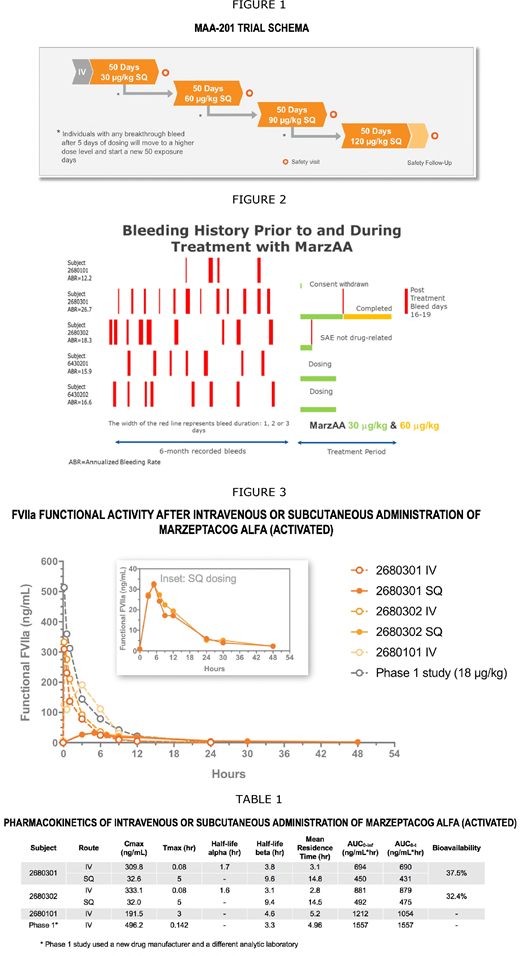Abstract
Background: In hemophilia patients with inhibitors, hemostasis can be achieved using bypass agents: activated plasma-derived prothrombin complex concentrates (aPCC), recombinant Factor VIIa (FVIIa), or emicizumab - that can only manage hemophilia A. Marzeptacog alfa (activated) (MarzAA), an engineered recombinant FVIIa with enhanced biological properties enabling subcutaneous (SQ) delivery was developed using a rational protein design approach. It has 7-fold increased catalytic activity and prolonged duration of effect demonstrated in a single-dose intravenous (IV) study that documented safety. Daily SQ dosing in dogs demonstrated achievement of stable trough levels of MarzAA that are believed to be effective for prophylaxis.
Aims: Phase 2/3 Study MAA-201 (NTC03407651) will determine if SQ MarzAA can provide effective prophylaxis. This study complies with the Declaration of Helsinki and is approved by recognized research ethics committees. Up to 12 subjects with inhibitors, who have an annualized bleeding rate ≥12 (ABR), and sign informed consent, will participate.
Methods: After an 18 mg/kg MarzAA IV bolus, pharmacokinetics and coagulation parameters were measured for 24 hours followed by 30 mg/kg MarzAA SQ with pharmacokinetics and coagulation parameters measured for a further 48 hours to calculate bioavailability. Subjects then received daily 30 mg/kg MarzAA SQ for 50 days. If no spontaneous bleeding events occurred the subject proceeded to safety follow-up 3 weeks after the last dose. If spontaneous bleeding occurred, dose escalation occurred sequentially to 60, 90 or 120 mg/kg for 50 daily doses as needed (fig 1). Subjects were monitored for treatment-related changes in Quality of Life measures and tested for anti-drug antibodies to MarzAA and FVII weekly. ABR was compared to the subjects prior ABR.
Results: 5 participants have been enrolled (Median ABR 16.6; Range 12.2-26.7) (fig 2). One participant with historical ABR 26.7 has completed the study with no bleeding at 60 mg/kg MarzAA but had a spontaneous bleed 16 days into the follow-up period when no longer receiving study drug. In a participant with previously-treated but currently-untreated and uncontrolled hypertension, a fatal hemorrhagic stroke deemed unrelated to study drug occurred on Day 11. Pharmacokinetics are shown in fig 3. IV half-life of 3.5 hours was increased to SQ half-life of 9.5 hours. Levels of MarzAA at Tmax 5 hours after SQ injection were similar to levels at 6 hours after IV infusion. Median subcutaneous bioavailability was 35%; Range 32.4-37.5%. Prothrombin Time baseline of 12-12.7 seconds fell to 8-9 seconds after 18 µg/kg IV infusion (normal 9.4-12.5 seconds). Prothrombin Time gradually declined to 8.7 seconds after 7 days of 30 µg/kg SQ injection. No anti-drug antibodies have been detected to date.
Conclusion: This study demonstrates that an individualized dose of daily SQ MarzAA can provide effective prophylaxis in hemophilia patients with inhibitors.
Supported by Catalyst Biosciences
Levy:Catalyst Biosciences: Employment, Equity Ownership. Mahlangu:Sanofi: Research Funding, Speakers Bureau; Roche: Consultancy, Research Funding, Speakers Bureau; LFB: Consultancy; NovoNordisk: Consultancy, Research Funding, Speakers Bureau; CSL Behring: Consultancy, Research Funding, Speakers Bureau; Chugai: Consultancy; Catalyst Biosciences: Consultancy, Research Funding; Biomarin: Research Funding, Speakers Bureau; Biogen: Research Funding, Speakers Bureau; Bayer: Research Funding; Amgen: Consultancy; Alnylam: Consultancy, Research Funding, Speakers Bureau; Shire: Consultancy, Research Funding, Speakers Bureau; Sobi: Research Funding, Speakers Bureau; Spark: Consultancy, Research Funding. Del Greco:Catalyst Biosciences: Employment, Equity Ownership. Booth:Catalyst Biosciences: Consultancy.
Author notes
Asterisk with author names denotes non-ASH members.


This feature is available to Subscribers Only
Sign In or Create an Account Close Modal